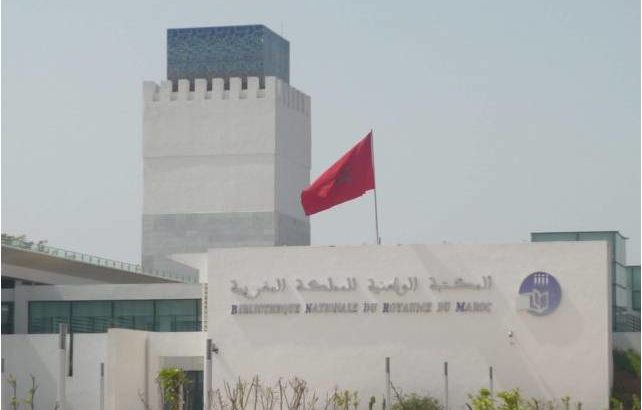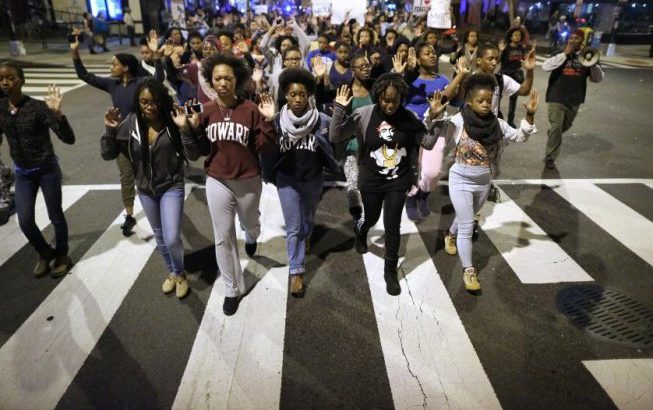América del Norte / Estados Unidos / 14 de agosto de 2016 / Por: Julia Wallace
The fury against the murder of Black people has become international, and with it, the question of how to fight police terror. We are already in the streets, protesting and shutting down highways and bridges in the face of the police and politicians. Protesting is critical, but what about strategy? What can be done in the face of injustice? The solution is not having more Black faces in positions of power. We have elected Black mayors, governors and a Black president, yet anti-Black racism, state-sanctioned brutality and mass incarceration have only increased over the last 30 years.
In frustration, some individuals have called for Black people to arm ourselves against the police. Black people have a right to defend ourselves against police terror and bigotry. But how? No single individual can hit the system where it matters. No lone shooter can end or even stymie the continuation of police brutality.
When one police officer is removed, many more crop up to replace him. Five police were killed in Dallas: they, too, will be replaced. Politicians attempted to use the deaths of police in Dallas and Baton Rouge to break apart and intimidate the Black Lives Matter movement. Instead, the movement experienced a renewed wave of resistance. But the question persists: How do we stop these racist, killer cops?
Social inequality and class divisions under capitalism reinforce and perpetuate racism, which will never end without attacking its structural basis. We must organize as workers and fight together against capitalists, cops and the state. This is the only way to move forward.
Revolutionary socialists are not pacifists, but martyrdom and individual vengeance have no place in our strategy. Individual armed Blacks cannot defend the community against racist policing. Armed organizations alone have defended themselves for a time but as soon as they posed a threat to American capitalism and its institutions, they were smashed by state repression.
Defend the Black Community
The examples of the Black Panthers, Black Liberation Army and other armed organizations in the 60’s and 70’s grew out of popular frustration with pacifism. However, guns alone could not halt the police attacks. The Panthers were able to hold off the newly formed LAPD SWAT team during a raid on their L.A. headquarters in 1969. This was because of community mobilization to defend the Panthers due to in part their projects like clinics and free breakfast program. However, the police and FBI used the Panthers’ arms as a pretext to carry out a brutal attack on the organization and its members. The Panthers regarding members and arms were not prepared to engage the State in an armed struggle.
But no single individual can hit the system where it matters. No lone shooter can end or even stymie the continuation of police brutality.
The police targeted and busted the Panthers. They blunted their revolutionary potential through fire and the heavy weight of the judiciary system: prosecutions, costly fines and bails, frame-up cases, solitary confinement.
Today, if a similar phenomenon led by Blacks, oppressed people, or revolutionary groups were to arise, it would be violently decimated unless it were thousands, millions strong. A couple weeks ago, we watched as Dallas police unflinchingly detonated a bomb, executing Micah Johnson with no trial, no evidence presented in a court.
Community organization is one way of building resistance. The Panthers secured the support of the community through health services and breakfast programs for kids. People called on their assistance, rather than the police, to resolve conflicts within the Black community.
Community defense means solidarity. Solidarity actions in the streets against police killings turn into protests that can shut down the city. We can and must take the streets. With greater organization, mobilizations can target commercial districts and block highways. Yet, there is a power that is at our disposal that we cannot afford to do without: workers’ class-power.
Civilian Boards: Can the Community Control the Police?
The perspective of “Community Control Over the Police” argues that there be civilian oversight around the police. Some community organizations and groups in the left are putting forward this slogan. This was also proposed in the past by Black Panther Bobby Seale, who argued that having civilian boards with authority over the police and hiring/firing power are opposed by the police in every city it’s proposed. Currently, Los Angeles Police Commission is used for community members to voice concerns about the police. Members are appointed by the mayor. The Police Commission also has no power over LAPD to discipline, hire or fire. Even when the Police Commission has disagreed with LAPD, there is no power over the police department.The police continue to kill with impunity.
In the face of this sham commission, other organizations have proposed a civilian police board. But would these boards be a mechanism for the community to control the police?Unión del Barrio, a Los Angeles-based Mexicano Revolutionary Nationalist & Raza Internationalist organization, has recently proposed this civilian police board to be implemented in LA, comparing it to the already-existing Los Angeles School Board (LAUSD). It should be noted, though, that the police are not teachers—they are enforcers and class enemies. The purpose of their profession is to safeguard the capitalist order and repress dissent.
Therefore, the community having some decisions over the police mistakes the role of cops. We want to end the police, not hire nicer or friendlier ones. We do not seek greater representation of oppressed peoples among cops. For decades, there has been a poverty recruitment of Black and Brown youth: highly-funded marketing campaigns and recruitment specifically targeting young men and women of color straight out of high school.
A rainbow-colored police force does not change the racist nature of the institution and its function. The police as an institution will always repress regardless of the race of the police officer (Los Angeles the LAPD is the most murderous police department around the country and has a majority Black and Brown police force). With no real sway over the law enforcement force as a whole, a civilian police board that takes on part of the hiring process will only lend a “democratic” cover to police and the State.
We must organize as workers and fight together against capitalist, cops and the state. This is the only way to move forward.
Organizing as a class
The exploitation of the working class ensures the continued concentration and accumulation of capital and power in the ruling class. This money and power is bothguaranteed by and invested in the State, its repressive forces (police, national guard, etc.) and «soft» capitalist institutions (segregated education, corporate media). We go to work every day and make the bosses richer. As long as we remain passive, the wellspring of the police—and the racism they systematically exercise—will never dry up. Without workers to produce wealth, cities would come to a standstill. Without our labor, the bosses are nothing. Without our labor, the nation is nothing. Our immediate task is to unite as a class to fight against the bosses’ thugs, the police.
As much as this white supremacist society hates Black people, as much as we insist and fight to ensure that Black Lives do Matter in a society where they don’t, Black people cannot combat police violence alone. The capitalist system thrives on division. It is in the interest of the ruling class and white supremacists to maintain the systemic oppression of people of color and to sucker working-class whites into defending reactionary, ultimately anti-worker policies and the rich, rather than aligning with the oppressed. Trump epitomizes this false consciousness among white workers, tapping into the disunity within the working class. We need to organize together and form a cohesive and combative organization that brings the experiences of oppressed people of the working class together.
Organizing under the slogan, “Strike Against Police Terror” has the potential to build activesolidarity toward an effective fightback against police.
Unions are supposed to stand up for workers and the community. We must put up the fight to make our unions take a stand against racist cops. This means holding work stoppages when the cops kill one of us, marching against police brutality, organize against police terror and expel cops from working-class organizations and unions.
Workers’ organizations must come together in a united front against racist police killings under the slogans, “No Cops in Our Unions” and “Strike Against Police Terror.” This has the potential to build active solidarity toward an effective fightback against police. We should bring these proposals to our workplaces, union meetings and other working class organizations. The campaign Left Voice is apart of Strike Against Police Terror (StrAPT) seeks to organize and mobilize union, non union, under employed and unemployed people of all genders, ethnicities and disabilities as a force to strike against police terror. We will use our power as a class and as oppressed people to fight capitalism and its armed forces: the police.
The Graveyard of Social Movements
Both the Democrats and Republicans have presided over the torture and killing of Black people and mass incarceration. Police chiefs, mayors, governors and presidents: from top to bottom, they uphold the racist system.
On May 19, 2015, a month after Freddie Gray was killed from spinal trauma caused by Baltimore police, President Obama signed the «Blue Alert” law to protect police by creating a national system that would alert them to threats. On May 28, 2016, Louisiana Governor John Edwards signed the “Blue Lives Matter” bill into law to include the police as a “protected group” in hate crime statutes. In doing so, Governor Edwards equated the armed forces of the state to the very oppressed people and communities they are hired, trained, and strapped to harass, lock up, and kill.
These laws are being crafted to secure safety for cops as they murder us in cold blood.
After the murders of Alton Sterling and Philando Castile and after the Dallas shooting, the Democratic Black Congressional Caucus and other Capitol Hill politicians lined up to demand a a “gun control debate.” No measures to address the murder of Black people by the police were discussed. No sit-in for the lives of over 130 Black men, women, and children killed this year by cops was proposed. These laws are being crafted to secure safety for cops as they murder us in cold blood.
The overtures by Democratic Party leaders are meant to dampen the movement of resistance proliferating throughout the country. Any political organization that has capitalists as its financiers will only be controlled by them. We must break from the politicians and parties of the capitalist class.
The question of police is not a moral one; the police are the armed force of the state, the same state that secures profits for capitalists and offers misery to most workers and the people. Police are the guardians of this system. That racism is rampant among police officers and woven into the institution of police is beyond question. The power to hire and fire police does not change their social role. As long as there is capitalism, there will be cops enforcing it. Oppressed communities will not control the police until they abolish it. That is, until capitalism receives its death blow and there’s no longer need for a special force that protects the rich and keeps the oppressed in check.
We must organize and unite as a class to end racist police brutality, for the dissolution of cops only made possible through the abolition of the class system and unequal social relations the police were created to maintain.
Source: http://www.leftvoice.org/How-We-Fight-Against-Police-Terror










 Users Today : 31
Users Today : 31 Total Users : 35460572
Total Users : 35460572 Views Today : 47
Views Today : 47 Total views : 3419529
Total views : 3419529